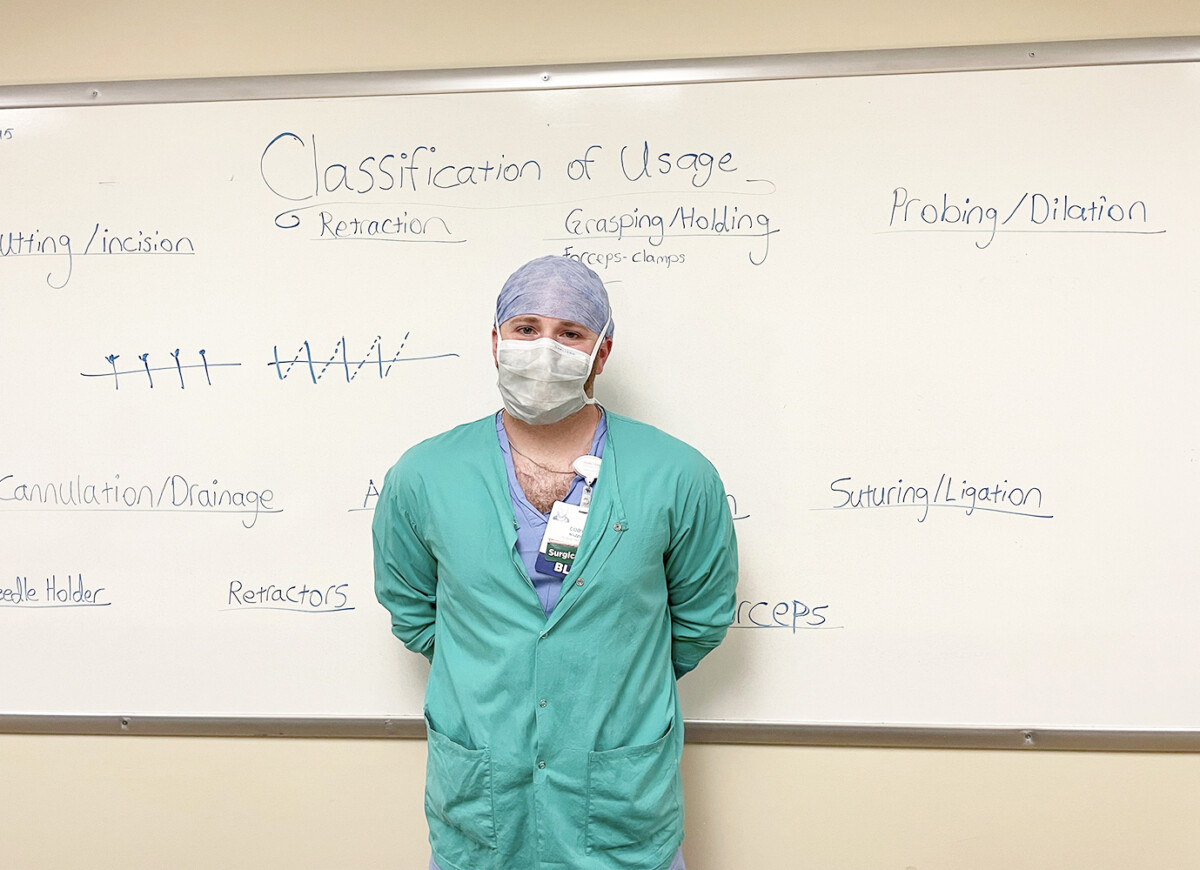‘This Is Exactly Where I Wanted to End Up’

Cody Mazza enjoyed working at The University of Vermont Medical Center as an operating room assistant, but when given an opportunity to become a surgical tech, he jumped on it. “I loved being an Operating Room Assistant, but for me it felt like a stepping-stone position,” he explains. A new UVM Health Network workforce development initiative, the Surgical Tech Pathway Program, was the on-the-job education he needed to take the next step in his career.
The program provides an opportunity for employees at UVM Health Network hospitals in Vermont to receive comprehensive surgical tech training at no cost, while at the same time being paid. It aims to respond to the national nursing shortage by training techs to fill open positions to better support the existing nursing staff.
Surgical techs play an essential role in the operating room. Their main responsibilities include organizing and preparing surgical instruments, maintaining sterile environments and placing patients in the position needed for a specific surgery. While the surgeon works, techs pass the instruments and collect and label surgical samples. Adding surgical techs to an operating room team reduces the overreliance on surgical nurses and helps to address staffing vacancies by training people for specific tasks at a time when hospitals are facing workforce shortages.
The lack of college and vocational training programs in Vermont means there are a lot of hospital tech positions, including surgical tech, that we haven’t been able to fill because we just don’t have enough techs coming up in our area. Instead, we’ve been reliant on nurses only to fill those positions at a time when there is a nursing shortage. Adding surgical techs to the staff supports our nurses and patients in the care we provide.
Monica Goldwater, BSN, MBA, the Nursing Director of Perioperative Services at UVM Medical Center.
The initiative, which began as a pilot program at UVM Medical Center earlier this year, will launch with employees from UVM Health Network – Porter Medical Center in Middlebury and UVM Health Network – Central Vermont Medical Center in Berlin in October.
“We are always looking to see how we can maximize the reach and efficiency of our workforce development programs, and those two things really go hand in hand,” says Megan Foster, the Workforce Development Coordinator at UVM Health Network – Central Vermont Medical Center. “No single hospital could regularly run a program like this on its own so we designed it in such a way that our Network hospitals will share resources and share costs, making it sustainable.”
This is a big step for us as an organization. We’ve been working hard to develop programs that benefit multiple hospitals in our Network, and the Surgical Tech Pathway Program is another sign that we’re making substantial progress toward that goal.
Elizabeth Madigan, Vice President of Organizational Development at the UVM Health Network
Participants will receive four to six weeks of classroom education from Nurse Educator Maria Haley, BSN, RNFA, CNOR at UVM Medical Center. Following the period of classroom instruction, participants will train primarily at their home affiliate hospital over the course of eight to 10 months to receive enough clinical experience to work as fully-trained surgery techs. If they need round out their experience at another affiliate, they’ll be able to do that. Afterward, they’ll work at their respective Network hospital.
“Training across our affiliate hospitals allows our students to gain hands-on experience with surgeries at community hospitals and our academic medical center, UVM Medical Center,” says Haley, whose efforts ensured that the program participants are authorized to take the surgical tech examination provided by the National Center for Competency Testing (NCCT) once they’ve completed their training. “The opportunity to train at multiple affiliates will ensure that our students are able to see and do everything they need to be fully trained and prepared,” she says.
Without the rigorous program Haley devised, they would have to work on the job for three years to become eligible to sit for NCCT test. This is what makes the program the first of its kind in Vermont: It sets up participants to become fully-certified members of their profession.
For Mazza, the new role is a welcome new step in his career. “As a surgical tech, you’re helping with the cases, you’re scrubbing in with the doctors and the nurses, and you’re there making sure things go well for the patient – you’re just a lot more involved and you have a lot more responsibility,” he explains. The pay is also better, he adds with a laugh.
